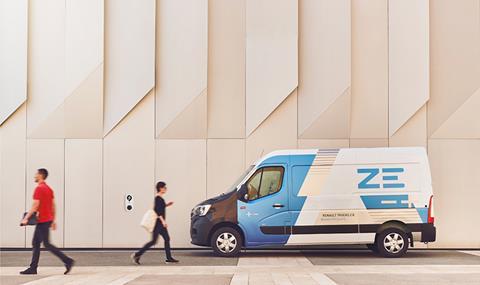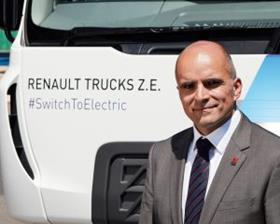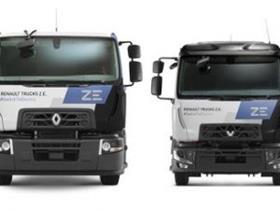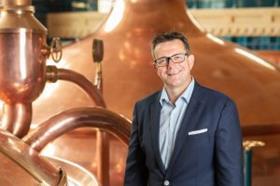
A brand-new series of Freight in the City webinars kicked off on 11 February with a focus on urban innovation and electric delivery vehicles, in partnership with Renault Trucks UK and Ireland. MT takes a look at some of the key themes explored in this engaging session.
Chairing the first of the Freight in the City webinars, MT editor Steve Hobson acknowledged how the Covid-19 pandemic had led to fundamental shifts in freight traffic in city centres, as people left offices to work from home.
As things recover, while delivery patterns may change, the key challenges of air and noise pollution, congestion, road safety and climate change are still going to exist.
“So, in a way, the pandemic perhaps gives us an often-used phrase, ‘the chance to build back better’, and hopefully this will happen. We can also see that electromobility is going to play a huge, huge role in this process,” he added.
Collaboration drives innovation
Rikesh Shah, head of commercial innovation at TfL, spoke about the organisation’s partnership approach with industry to encourage innovation to help improve the lives of Londoners.
TfL recognises the importance of freight in the capital to keep the city functioning, with 90% of goods moved in London travelling by road.
But with a 39% increase in freight kilometres travelled in the past 25 years and road space remaining the same, significant challenges around congestion, pollution and road safety need tackling.
TfL’s FreightLab scheme was therefore launched in November 2019 to encourage innovation to focus on some of these themes.

“The first thing we did was to target innovation and ideas from across the world. And you could be anyone: you could be a start-up, you could be an academic, you could be a corporate or someone else we wanted to hear from about an idea,” said Shah.
“All you needed was an idea that had been tested in some shape or form and wasn’t just a conceptual diagram.”
TfL provided seed funding and subject matter expertise from its own workforce and partners, as well as offering up land for people to test out their innovation without cost.
New ideas are then tested out on the road with major freight carriers, including Ceva Logistics, DPD, Royal Mail and UPS.
The six successful trials chosen for FreightLab will explore innovation around digital kerbside management; reduction in air and noise pollution; energy efficient tyres for electric vehicles; non-motorised last-mile deliveries; behavioural analysis for accident and near-miss prevention; and a courier smart connection platform.
“So you can see that we've got six very different ideas, which we want to test. And we'll be running trials from three months to up to 12 months,” said Shah.
“At the end of that we'll explore which ones are scalable, which ones are working, we'll be sharing data with each other. And then hopefully, that results in new solutions coming in, that creates a sustainable difference in London.”
Electro-mobility for urban freight
Carlos Rodrigues, MD of Renault Trucks UK and Ireland, focused on the significance of electro-mobility to decarbonise urban freight.
“It starts in the urban environment, and it starts now,” he said. “There is no need to wait for a better technology, the technology available today and what we provide for urban transport, I think fits most of our customer needs.”
Highlighting the typical well-to-wheel CO2 emissions for an electric truck travelling around 150km per day using a typical EU electricity mix (comprising power from both sustainable and non-sustainable sources), Renault’s data shows an approximate 60% reduction compared with its traditional diesel counterpart.
This benefit is even more pronounced when looking at the “cradle to grave” lifespan of a 16-tonner, from the raw materials used in production through to recycling parts at the end: for a country such as France,

with a highly decarbonised electricity grid, the CO2 impact can be reduced by as much as 80% over a typical 12-year lifecycle (or 500,000km).
“And that for me is a strong message,” said Rodrigues. “Because what we know that there is a strong commitment as part of the UK government’s Green Deal that there is huge investment into wind and solar, so we know that in the coming years the electricity in UK will become even more decarbonised. So that means that the decisions made today on electric vehicles will only improve in the coming years in terms of impact on CO2.”
Step by step
The shift to electrification for the freight sector will come segment by segment and market by market, noted Rodrigues, as it is not yet an option for all operations.
Electric vehicles are already viable today for both urban distribution and waste sectors, he said, but will be expanded to cover regional operations and other key sectors, such as construction, with different demands on vehicles.
“But clearly today, I think we could almost say that - and maybe I'm a bit ambitious - but electro-mobility, technically speaking, can become mainstream very quickly in the urban environment for HGVs.”
Renault Trucks has simplified the process of buying a new electric truck for customers. It will work with them to provide a complete package from helping pick the right-sized battery (which all come with a vehicle lifetime guarantee) and exploring charging requirements, through to maintenance, finance and insurance guidance.
“So we take away that that risk and that fear from the customers to help them move to the next step,” said Rodrigues. “I think that's the big move forward with electro-mobility and electric vehicles.”

Renault Trucks has a full range of electric vehicles on the market for the urban sector, starting from 3.1 tonnes up to 26 tonnes. It is working in collaboration with a number of bodybuilders to offer a large variety of chassis cab platforms for customers to suit their needs.
Latest customer orders in the UK include bakery Warburtons and waste contractor SUEZ. Warburtons will be operating a 16-tonne D ZE to transport bakery goods in London, while SUEZ Recycling and Recovery UK will be operating the first fully electric Renault Trucks D Wide ZE 26-tonne refuse vehicle in the UK, to be used in Bristol city centre.
To highlight its global commitment to sustainable transport, Renault Trucks has committed to 35% of vehicle sales being electric by 2030, with parent Volvo Group having aligned to the Paris Climate agreement of being net-zero by 2050 at the latest.
It also aims to protect resources by working with customers to remanufacture or refurbish trucks to increase their lifetimes and support a circular economy. “That's another way to protect our planet and to decrease CO2,” Rodrigues added.
Electric pathway for Carlsberg
Carlsberg Feldschlossen in Switzerland has been a long-time advocate of electric trucks, starting back in 2008 with delivery of five UK-built Modec 7.5 tonners.
The well-known brewery brand was recognised as being an innovator at the time, with the decision to use e-trucks welcomed by customers.
This led to Carlsberg working with a Swiss company back in 2013 to develop its first 18-tonne electric truck, with an overwhelmingly positive response from drivers who wanted to see more rolled out on the fleet.

Roll on to today, and Carlsberg is on track to order 20 electric vehicles from Renault Trucks for use in its operation delivering to 10,000 bars and restaurants in urban areas.
With 23% of market share in Switzerland, and being the number one beer producer, it was very important to Carlsberg to ensure its deliveries were sustainable, both from an environmental perspective and brand positivity.
“The connection between sustainability and connecting with the brand has huge benefits for the whole company,” said Thomas Stalder, VP Integrated Supply Chain at Carlsberg Feldschlossen.
Stalder explained that in Switzerland, road tax is not payable on electric trucks, which helped with the business case for the purchase.
While the company’s ambition for zero emissions and zero accidents was also supported by the transition to cleaner fleet vehicles, as was the positive experience for drivers.
Up for debate
In a lively Q&A session, MT editor Hobson posed topical questions from the audience to presenters on a range of subjects, including:
- Can electric vehicle technology inform city regulation, such as the London Lorry Control Scheme?
- What is the effect of cold weather operations on real-life battery range?
- How will smaller operators make the leap to electric vehicles?
- Is the carrot or stick better for encouraging clean technology transition?
- Is there a trade-off between range and payload?
- How can innovation improve kerbside space and management?
- Is there appetite for quiet, out-of-hours deliveries?
- Is the right recharging infrastructure in place?
You can find out the answers and watch the original webinar presentations on-demand, free of charge, on freightinthecity.com














